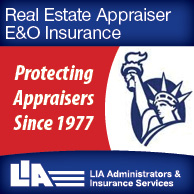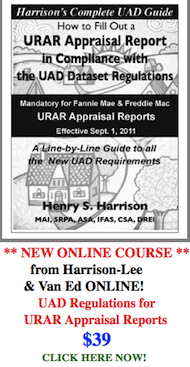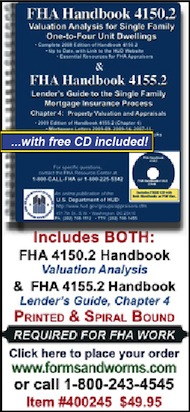Ask Henry
Dear Mr. Harrison,
I'm a residential appraiser in New York, primarily covering the five boroughs of New York City. I come across many homes that have upgraded kitchens and bathrooms, finished basements, finished attics and/or small extensions. Many of these upgrades are not filed with the City, and I've been getting requests from lenders asking if these are 'legal' upgrades or additions. I have spoken to the NYC Building Dept. and their response is almost always the same: they would need to send an inspector to the property to determine the legality of the upgrades (ast no work permits have been filed). I have two questions:
1) Say there are no work permits allowing for the upgrades that are already in place, can I still add value for the areas that were upgraded? Can I include the extra square footage, the finished attic space, etc., in the area above grade? And can I apply adjustments for kitchen remodeling or other upgrades if there were no work permits for the upgrades?
2) Is it my duty as an appraiser to notify the lender that there were no permits filed for the work?
Thank you for all the insight and help you provide! I await your response.
Nechama D. Arnold
Arnold Appraisal Group, Inc
arnoldappraisals@gmail.com
Dear Nechama,
Millions of home improvements are made every year without building permits. Most appraisers don't get into the legality of an improvement they observe, unless they have some reason to suspect that it was made without a permit. In that case, they would be required to report their suspicions and comment what effect -- if any -- this has on the value of the property. I would be very careful about interviewing an owner. The safest thing you can ask would be, "Is there anything you would like to tell me that you think would be helpful to me in making this appraisal?" The problem is that they will start to ask you questions about the appraisal, and unless the lender/client has authorized you to discuss the appraisal with the homeowner, it is a violation of the USPAP to do so.
All things being equal, what you see is what you appraise. However, if you suspect the property is an illegal use, you must report it and state the basis of your suspicions. It is appropriate for you to ask a building inspector for a record of the permits that have been taken out on any property that you are appraising — but not ask if there is a permit for any specific upgrade. If this triggers an inspection, you and your lender/client run the risk of getting sued. You should quote the building inspector if you think what he told you was significant.
I think an appraisal report should speak for itself. I would think twice before volunteering to a lender/client any information that was not in the appraisal report. When a lender asks you specific questions about your appraisal, you probably should answer them preferrably in writing, and only if the information is not confidential. This is the problem with interviewing homeowners. If they give you some negative information about the property, and then say it is confidential, you are in a professional Catch 22. You are obliged to report negative information about the subject, but you are also required to respect confidentiality.





















